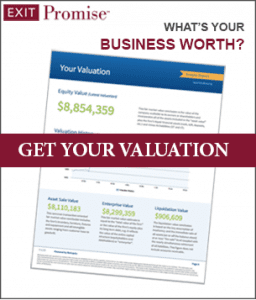- To Sell or Not to Sell Your Business - July 15, 2014
- The Value of a Business Plan in Selling Your Business - December 19, 2013
 To sell or not to sell, that is the question many business owners ask themselves at least once during their tenure as business owners. Sometimes, the decision to sell is easy if the owner is ready to retire or has decided to pursue a new career or business opportunity. However, in many cases, business owners struggle with this critical decision. Fortunately there are several steps you can take to make an informed and stress-free decision on whether to sell your business now, later, or not at all. In all cases seek the advice of several third party professionals such as a Business Attorney, Certified Public Accountant (CPA), Business Appraiser and/or Broker, and a Financial Advisor as well as consultants in your industry.
To sell or not to sell, that is the question many business owners ask themselves at least once during their tenure as business owners. Sometimes, the decision to sell is easy if the owner is ready to retire or has decided to pursue a new career or business opportunity. However, in many cases, business owners struggle with this critical decision. Fortunately there are several steps you can take to make an informed and stress-free decision on whether to sell your business now, later, or not at all. In all cases seek the advice of several third party professionals such as a Business Attorney, Certified Public Accountant (CPA), Business Appraiser and/or Broker, and a Financial Advisor as well as consultants in your industry.
Evaluate the salability of the business
You may be ready to sell, but your business may not be ready. Your books and records for the last three to five years need to be in good order so that they will pass the test of due diligence performed by a buyer. You should consult with a CPA to discover any financial, tax, and bookkeeping issues that should be addressed before putting the business on the market. Ideally, the operational aspects of the business also need to be in order so a buyer will be impressed with how you manage the business and they can visualize stepping in and taking over a smooth running machine. A Business Broker can provide valuable input regarding both financial and operational issues that might need to be addressed. Brokers know from experience what business profile issues will be a plus or a minus regarding the salability of your business, and can recommend solutions to address the negatives. In some industries, industry-specific consultants provide valuable input as to how to improve the business and make it more attractive to buyers within your industry.
Determine the business’s value
In most cases, a business valuation should be performed by a certified business appraiser. A business valuation provides several benefits beyond just providing the value of the business. Even if you decide not to sell now based on the valuation, it is a valuable tool in helping you identify what can and should be done to improve and grow the value of the business. It is a useful tool for tax planning to help minimize the tax liability on the gain from the sale. Some business owners have valuations performed every several years to measure the success and effectiveness of an exit plan that has been established to achieve a long-term business value goal. A business valuation pays for itself many times over.
Investigate if a buyer can secure third-party financing to buy the business
You should consult with financial institutions to determine if a qualified buyer could secure a loan to buy the business, or if there are issues that need to be resolved before third party financing is possible. If a business is advertised as pre-qualified for financing, you greatly increase your chances of attracting interest from buyers and their advisors who understand the importance of being pre-qualified. A business broker can also recommend the best professionals and institutions to contact in order to explore all of the financing possibilities. Brokers know the go-to professionals who are experienced and skilled at identifying financing solutions for businesses that may face challenges in gaining approval for financing. A business valuation is also helpful in the pre-qualifying process as most SBA-backed loans require a valuation for loan approval. In some cases, the pre-qualifying process will reveal that a business owner will need to commit to a significant level of seller financing to complete a successful sale.
Determine the financial gain needed from a business sale to meet financial goals
You may need to consult with a financial advisor to determine the financial gain needed from the sale to achieve your retirement goals or other future plans. A CPA who is an expert in the tax issues regarding a business sale can provide advice on how best to structure the sale to minimize the tax liability and maximize the after-tax profit.
Determine your post-sale goal
Many business owners who are ready to sell have not given serious thought about what they will do after the sale. The next phase in your life after business ownership may require significant preparation and/or training in order to make a smooth transition from business owner to that next phase. If buying or starting another business is an option, consult with a Business Broker. A Broker can match possible new business opportunities with your business ownership experience, interests and financial profile. In some cases, after exploring other options and career paths, business owners decide to stay in their existing business. They may determine the grass is not greener on the other side, and they move forward with a greater appreciation and renewed passion for their current business.
Sell your business | Don’t procrastinate!
 If there is even a remote possibility that you might sell your business in the future, you should educate yourself now on the issues and processes involved in selling a business and start exit planning for a possible sale. Too often, business owners wait until they are ready to sell or must sell before they have done any exit planning. It’s important to understand that the manner in which you manage the day-to-day operations of your business now will likely be the subject of investigation by buyers years from now. This tendency toward procrastination has led to many business owners recognizing a much smaller than possible gain on the sale of their business. In the worst cases, the business cannot be sold due to the lack of exit planning.
If there is even a remote possibility that you might sell your business in the future, you should educate yourself now on the issues and processes involved in selling a business and start exit planning for a possible sale. Too often, business owners wait until they are ready to sell or must sell before they have done any exit planning. It’s important to understand that the manner in which you manage the day-to-day operations of your business now will likely be the subject of investigation by buyers years from now. This tendency toward procrastination has led to many business owners recognizing a much smaller than possible gain on the sale of their business. In the worst cases, the business cannot be sold due to the lack of exit planning.
Selling a business can be a complex process that takes several months. A small investment in education, preparation and planning will lead to the highest possible gain on the sale and will likely shorten the time needed to complete the sale.












